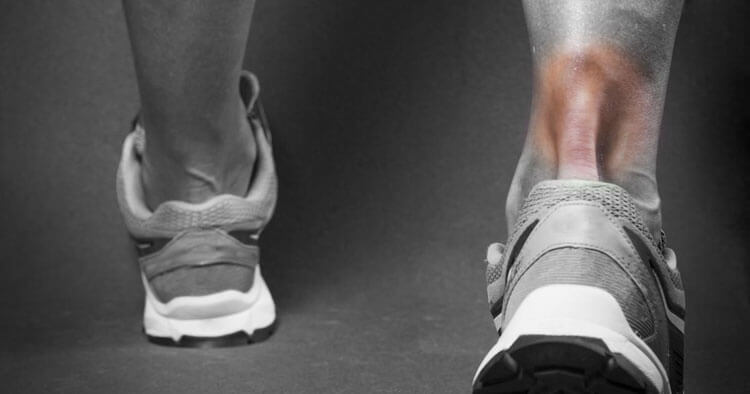Achilles Pain Is A Common Reason People See A Physio
Treatment for Achilles pain is one of the most common reasons people seek our assistance at Sydney Physio Clinic and the good news is that with most minor to moderate
Achilles tendon complaints the pain will settle given time, responding well to physiotherapy treatment. The not so good news is that a flare up of pain sometimes occurs as individuals progress back to full activity, if the return to full exercise load is to quick, or when patients don’t follow thorough with their rehabilitation program following a bout of pain.
Management Of Achilles Pain
As part of your treatment regime your physiotherapist may utilize a number of approaches, anything from implementing RICE, anti-inflammatory medication (oral or topical) , the prescription of heel lifts, or using
kinesio taping techniques to off load stretching of the tendon, to instigating a more active approach to rehabilitation. The exact approach will depend on the presence of inflammation, degeneration, or tears to the tendon and the stage of injury the Achilles pain is at on initial consultation.
The use of an active rehabilitation approach is our preferred method for managing Achilles tendinosis, using specific loading exercises to help the stimulation of tendon repair. Shockwave therapy, manual therapy and
dry needling are also to common approaches a Sydney physio may use when treating tendinosis to supplement an active rehab approach. At Sydney Physio Clinic we have found the use of shockwave treatment to be very effective in treating mid portion Achilles tendinosis. as well as managing pain in insertional Achilles tendon complaints.
The use of
orthotics (shoe inserts) and strengthening and neuromuscluar retraining to help normalise foot and lower limb biomechanics can also help in both settling and preventing a relapse of Achilles pain, prescription of such devices are assessed on an individual case by case basis.
Prognosis Of Achilles Pain
Frustratingly for patients there is no specific time frame for recovery, rehabilitation and return to play will be progressed as function improves. Any progression of activity needs to be carefully monitored to avoid an undesirable re-aggravation of symptoms, or drop in function. This is important as any attempt to progress activity levels too soon to can lead to re-injury and understandably significant frustration for the individual. Ultimately it may take months to feel better, however it is our goal to keep patients as active as possible during this time whilst the injury heals. Your physiotherapist will help guide you on what is safe for you to do to maintain fitness during your rehabilitation period, if you push the return to activity too aggressively, increasing load beyond what the settling tendon can withstand there is a risk you re-injure the area and prolong the entire recovery process.
Return To Play Following Achilles Tendinopathy
Achilles pain can require weeks to months off sport for the pain to settle. Any return to play rehabilitation process depends on the demands of your sport/s and
sport specific exercises are often incorporated with the rehabilitation regime. Sport specific rehab should be progressed to enable a safe and injury free return to play, gradually conditioning/strengthening the tendon enabling it to be primed to cope with the loads placed on the tissue during sport.
What To Expect With Achilles Tendon Pain
Severity of tendon injury coupled with the individuals compliance to treatment and managing the load exerted on the tendon ultimately determine how long the injury may take to settle. As previously mentioned there is sadly no set in stone time frame for recovery from Achilles pain. However you can still be active while your pain settles, and doing so is preferable, ask your physiotherapist what is safe for you to continue doing whilst the injuries recovers, physios are skilled in offering alternative loading options to help maintain fitness safely as injuries recover.
Preventing Achilles Tendinopathy
Below are a few ideas athletes should consider to mitigate the risk of developing any prolonged and frustrating Achilles tendon pain episodes.
- Consider accessing some professional coaching to ensure correct technique in your chosen sports, correct technique can often go a long way in helping limit excessive stress on the Achilles tendon (and your body in general).
- Always wear the correct footwear for your chosen activity and training, playing surface.
- When looking to progress your training be sure to adjust any frequency, intensity, duration and surface changes slowly, allowing time for your tissues to adapt.
- Always allowing adequate recovery time between training sessions, or workouts to avoid overloading the tissues through repetition.
- Warm up and down appropriately for your chosen activity, in an attempt to prepare the tissues for what is to come and help accelerate recovery times.
- Stop exercising if you experience any pain, or tightness in the back of your calf, or heel area. At the onset of symptoms commence RICE and seek professional assessment and advice.
Disclaimer: Sydney Physio Clinic provides this information as an educational service and is not intended to serve as medical advice. Anyone seeking specific advice or assistance on Treating Achilles Pain The Physiotherapy Way should consult his or her physiotherapist, sports medicine specialist, orthopedic surgeon or otherwise appropriately skilled practitioner.


